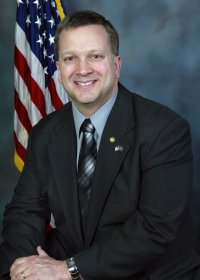After idling, ‘paycheck protection’ kick-started in Pennsylvania

By Andrew Staub | PA Independent
HARRISBURG, Pa. — There have been rallies, TV commercials and plenty of public speeches about so-called “paycheck protection” over the past several months, but all the while, legislation that would stop state and local governments from collecting public-sector union dues sat idle.
That changed Monday.
The House State Government Committee moved quickly and unexpectedly Monday, approving an amended version of the legislation along party lines, with Republicans voting yes and Democrats opposed. That sets it up for a possible floor vote, should it get past the Rules Committee.
“It’s budget week, so anything can happen,” said state Rep. Daryl Metcalfe, R-Butler, one of the most ardent advocates of paycheck protection and the chairman of the committee.
VOTE COMING? State Rep. Daryl Metcalfe, R-Butler, indicated there’s a chance paycheck protection could get a House vote this month.
Supporters of House Bill 1507 and its counterpart in the upper chamber, Senate Bill 1034, have described it as a good-government reform that would stop taxpayer resources — in this case, a payroll system or employees doing payroll — from being used to collect money that unions could use for political purposes.
Union officials have said the bills are designed to squash the voice of organized labor, which would certainly help Republican Gov. Tom Corbett, who is up for re-election and pushing for pension reform and liquor privatization, two issues that have drawn union opposition.
Many Democratic lawmakers have agreed the legislation is less about good government.
“The premise of the legislation, I believe, is deceptive at best,” said state Rep. Mike O’Brien, D-Philadelphia.
Like many others who opposed paycheck protection, O’Brien pointed to the deductions for health care and charities such as the United Way that employees have taken out of their paycheck. He also cited the state Treasury’s statements that it costs Pennsylvania less than $100 a year to handle the dues deductions.
David Fillman, executive director of AFSCME Council 13, said some lawmakers just want to “poke us in the eye.” He also said contractual language could allow the state to charge the union for such expenses, but noted an invoice has never been sent.
“If we received a bill, we would have paid it,” Fillman said.
Instead, Fillman found himself lamenting the bill’s movement, while House Minority Leader Frank Dermody, D-Allegheny, used Twitter to call it a “sneak attack” on public employees after Metcalfe called the committee meeting while the House was in session.
Lawmakers within both chambers, as well as outside supporters, are pushing for the legislation to be part of June’s annual budget discussion, Metcalfe said. Lawmakers have less than a week to get the state’s spending plan done by the June 30 deadline.
Budgetary deal-making could help push along the controversial legislation, which has a slightly different look after Monday’s changes in the House.
An amendment, also approved along party lines, would allow public employees who are not part of their respective unions to have their fair-share fees — contributions they must pay to the union to fund the cost of their representation — deducted from their paychecks.
The legislation would still effectively prohibit the collections of voluntary dues and political action committee contributions. The prime sponsor of House Bill 1507, state Rep. Bryan Cutler, R-Lancaster, said that was part of a compromise he’s been willing to make for months.
“My goal has always been about the use of state assets for political money gathering,” Cutler said.
Matthew Brouillette, president and CEO of the Commonwealth Foundation, a free-market think tank based in Harrisburg, said he’d like unions to collect all their funds. Still, he was happy to see the bill finally emerge from the House State Government Committee.
“This is a great day to close the loophole that has allowed one political interest to use taxpayers’ resources to collect their campaign contributions that are frequently used against taxpayers’ interests,” he said. “This is the first step of many that will have to be taken in order to end this injustice here in Pennsylvania.”
Staub can be reached at Andrew@PAIndependent.com. Follow @PAIndependent on Twitter for more.







